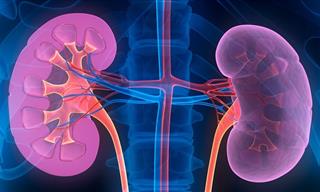It might not feel like it sometimes, but the adult bladder is designed to hold as much as half a liter (two cups) of urine before you’ll feel the need to relieve yourself.
Your body knows just how much is in there due to the fact that your bladder wall is filled with tiny receptors that send a message to your brain when your bladder has reached its capacity. Fortunately, the majority of us have full control over our bladder function, so when we receive this message, we can choose to relieve ourselves straight away, or hold it in because we’re not close to a bathroom.
But what are we doing to our bodies when we hold all this urine in?
Well, once you have made your mind up not to pee, the cylindrical sphincters in your bladder close up tightly in order to keep all that urine from leaking into your underwear. These tiny muscles are great at what they do, until you force them to do it consistently for a really long time, say if you’re a trucker and you’re holding your pee in on long journeys several times a week.
If you make it a habit of holding urine in for ages, you’re subjecting yourself to some pretty serious long-term effects, including a higher risk of infection. Constantly holding your pee in can weaken your bladder muscles, which could eventually lead to urinary retention – the dreaded condition that prevents you from being able to fully empty your bladder, meaning you’ll feel like you need to use the bathroom a lot more.
Holding in large volumes of urine for an extended period of time also exposes your body to some potentially harmful bacteria, which can increase your risk of getting a urinary tract or bladder infection.
All this sounds pretty bad, but it’s not exactly life-threatening, right? Well, that’s because you’re just not trying hard enough.
Enter Tycho Brahe: a Danish astronomer and alchemist from the 16th century. Brahe was a great scientist, contributing to the scientific literature on a wide range of subjects, including comets, planetary orbits, and supernovae. He also ended up in a duel with a fellow nobleman over the legitimacy of a mathematical formula, and because they chose to duel in darkness, he ended up losing the bridge of his nose.
For the rest of his life, Brahe glued a silver or gold nose replacement on his face. As colourful as all this is, Brahe’s cause of death is even more ridiculous. He reportedly refused to leave a feast to relieve himself because he believed it to be a breach of etiquette, but then once he got home, he found he was unable to urinate at all. He descended into delirium and died soon after when his bladder burst.
The good news is that his bladder wasn’t like most – in the vast majority of cases like this, a person will wet themselves before any bursting occurs. If bursting happens, it’s usually because the bladder was already damaged for some reason.
But not always. There have been some cases where people’s bladders burst because they were too drunk to notice the signal from their brain telling them to pee. Moral of the story? Don’t hold it in.
Source: sciencealert
Images: depositphotos
 Go to BabaMail
Go to BabaMail





















































